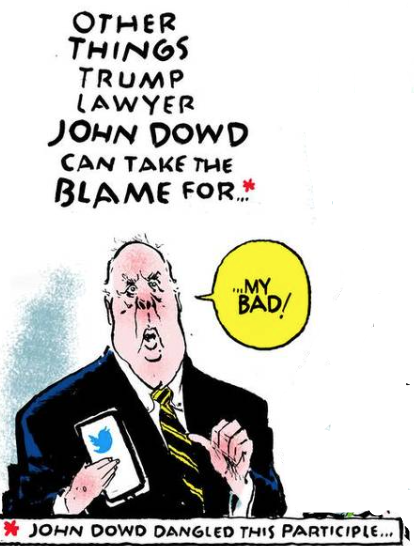My most recent post started out as a very minor note of approval about the continuing spread of singular they in journalism. Then the person who sent me the quote realized that Phillip Garcia, named in the cited newspaper story, had a preference for being referred to with the pronoun they, which nullified the point. So I modified the post to acknowledge that. I added a side remark that this caused a difficulty for me: although I find singular they fully grammatical and entirely natural with many types of antecedent, that's not true for singular personal name antecedents. I didn't reject the notion of following Garcia's preference; I said "I'll do my best, but it will be a real struggle."
Ironically, on re-reading the paragraph I saw it was more of a struggle than I thought: within minutes of learning about Garcia's preference I had unintentionally disrespected it by using "he". So I went back and corrected myself, overtly, the way people do in speech ("Phillip Garcia's profile reveals that he is — sorry, that they are…"). It was not snarky; it was an honest admission that I had found it hard to make an instant change to my syntactic habits. But it prompted an angry and disappointed reader signing in as Cass to comment* that my post was "immensely transphobic", and failing an immediate apology, "Language Log needs to take him off this blog."
This is Language Log, so let's be careful with our word choices. What has transphobia got to do with this? My young friend Magnus, born about 18 years ago as the daughter of a good friend of mine but now militantly trans-identified and male, expects to be called "he". I respect his wishes, of course. The use of they under consideration here has (normally) nothing to do with being trans. It's the requested usage of those who (whether trans or not) hate the binary sex distinction that Magnus has rebelled against in his own way; they wish to be referred to in a way that does not assign them to a sex category at all. I have young friends of that persuasion too, and I do my best to avoid the gendered third person singular pronouns when talking about them. I respect their choice.
Yet for simply touching in passing on a slight problem for the they-preference, I am suddenly the conservative hate figure of the week, targeted for dismissal and subjected to streams of hostility in an intemperate guest post by Kirby Conrod and a welter of comments underneath it. This hostility is, to put it mildly, unmotivated and misdirected.
Read the rest of this entry »


